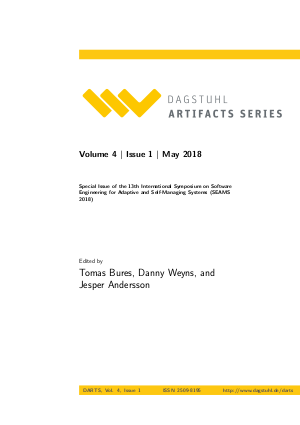DARTS, Volume 4, Issue 1
Special Issue of the 13th International Symposium on Software Engineering for Adaptive and Self-Managing Systems (SEAMS 2018)
-
Part of:
Volume:
DARTS, Volume 4 (ECOOP 2018)
Journal: Dagstuhl Artifacts Series (DARTS)

Editors
Publication Details
- published at: 2018-05-23
- Publisher: Schloss Dagstuhl – Leibniz-Zentrum für Informatik
- DBLP: db/journals/darts/darts4
Access Numbers
- Detailed Access Statistics available here
-
Total Document Accesses (updated on a weekly basis):
0PDF Downloads
Documents
Front Matter - SEAMS 2018 Artifacts, Table of Contents, Preface, Artifact Evaluation Committee
Abstract
Cite as
Special Issue of the 13th International Symposium on Software Engineering for Adaptive and Self-Managing Systems (SEAMS 2018). Dagstuhl Artifacts Series (DARTS), Volume 4, Issue 1, pp. 0:i-0:xiii, Schloss Dagstuhl – Leibniz-Zentrum für Informatik (2018)
Copy BibTex To Clipboard
@Article{bures_et_al:DARTS.4.1.0,
author = {Bures, Tomas and Weyns, Danny and Andersson, Jesper},
title = {{ Front Matter - SEAMS 2018 Artifacts, Table of Contents, Preface, Artifact Evaluation Committee}},
pages = {0:i--0:xiii},
journal = {Dagstuhl Artifacts Series},
ISSN = {2509-8195},
year = {2018},
volume = {4},
number = {1},
editor = {Bures, Tomas and Weyns, Danny and Andersson, Jesper},
publisher = {Schloss Dagstuhl -- Leibniz-Zentrum f{\"u}r Informatik},
address = {Dagstuhl, Germany},
URL = {https://drops.dagstuhl.de/entities/document/10.4230/DARTS.4.1.0},
URN = {urn:nbn:de:0030-drops-87096},
doi = {10.4230/DARTS.4.1.0},
annote = {Keywords: Front Matter - SEAMS 2018 Artifacts, Table of Contents, Preface, Artifact Evaluation Committee}
}
mRUBiS: An Exemplar for Model-Based Architectural Self-Healing and Self-Optimization (Artifact)
Abstract
Cite as
Thomas Vogel. mRUBiS: An Exemplar for Model-Based Architectural Self-Healing and Self-Optimization (Artifact). In Special Issue of the 13th International Symposium on Software Engineering for Adaptive and Self-Managing Systems (SEAMS 2018). Dagstuhl Artifacts Series (DARTS), Volume 4, Issue 1, pp. 1:1-1:4, Schloss Dagstuhl – Leibniz-Zentrum für Informatik (2018)
Copy BibTex To Clipboard
@Article{vogel:DARTS.4.1.1,
author = {Vogel, Thomas},
title = {{mRUBiS: An Exemplar for Model-Based Architectural Self-Healing and Self-Optimization (Artifact)}},
pages = {1:1--1:4},
journal = {Dagstuhl Artifacts Series},
ISSN = {2509-8195},
year = {2018},
volume = {4},
number = {1},
editor = {Vogel, Thomas},
publisher = {Schloss Dagstuhl -- Leibniz-Zentrum f{\"u}r Informatik},
address = {Dagstuhl, Germany},
URL = {https://drops.dagstuhl.de/entities/document/10.4230/DARTS.4.1.1},
URN = {urn:nbn:de:0030-drops-87102},
doi = {10.4230/DARTS.4.1.1},
annote = {Keywords: Self-adaptation, architecture, runtime models, simulator}
}
K8-Scalar: a workbench to compare autoscalers for container-orchestrated services (Artifact)
Abstract
Cite as
Wito Delnat, Thomas Heyman, Wouter Joosen, Davy Preuveneers, Ansar Rafique, Eddy Truyen, and Dimitri Van Landuyt. K8-Scalar: a workbench to compare autoscalers for container-orchestrated services (Artifact). In Special Issue of the 13th International Symposium on Software Engineering for Adaptive and Self-Managing Systems (SEAMS 2018). Dagstuhl Artifacts Series (DARTS), Volume 4, Issue 1, pp. 2:1-2:6, Schloss Dagstuhl – Leibniz-Zentrum für Informatik (2018)
Copy BibTex To Clipboard
@Article{delnat_et_al:DARTS.4.1.2,
author = {Delnat, Wito and Heyman, Thomas and Joosen, Wouter and Preuveneers, Davy and Rafique, Ansar and Truyen, Eddy and Van Landuyt, Dimitri},
title = {{K8-Scalar: a workbench to compare autoscalers for container-orchestrated services (Artifact)}},
pages = {2:1--2:6},
journal = {Dagstuhl Artifacts Series},
ISSN = {2509-8195},
year = {2018},
volume = {4},
number = {1},
editor = {Delnat, Wito and Heyman, Thomas and Joosen, Wouter and Preuveneers, Davy and Rafique, Ansar and Truyen, Eddy and Van Landuyt, Dimitri},
publisher = {Schloss Dagstuhl -- Leibniz-Zentrum f{\"u}r Informatik},
address = {Dagstuhl, Germany},
URL = {https://drops.dagstuhl.de/entities/document/10.4230/DARTS.4.1.2},
URN = {urn:nbn:de:0030-drops-87118},
doi = {10.4230/DARTS.4.1.2},
annote = {Keywords: Container orchestration, autoscalers, experimentation exemplar}
}